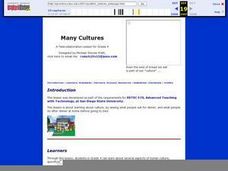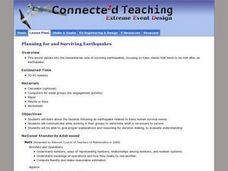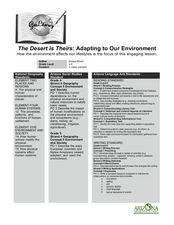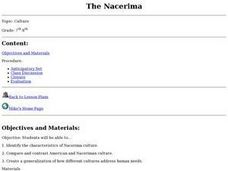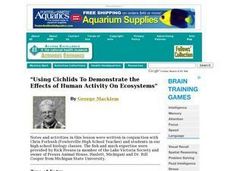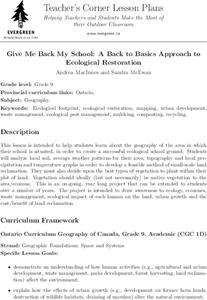Curated OER
Many Cultures
Fourth graders study about several aspects of human culture, specifically those in California. They examine California's agriculture, industry, and economic changes; and cultural changes since 1850.
Curated OER
Ladies, Contraband, and Spies: Women in the Civil War
Students use primary sources - diaries, letters, and photographs - to explore the experiences of women in the Civil War. By looking at a series of document galleries, the perspectives of slave women, plantation mistresses, female spies,...
Curated OER
habitat Powerpoint Project and Webquests
Using a provided PowerPoint template and a list of relevant web sites, 4th graders create an animal habitat presentation. This lesson plan includes relevant web sites, vocabulary, PowerPoint template, rubric and full lesson plan. This...
Curated OER
HUMAN/ENVIRONMENT INTERACTIONS: CLIMATE
Students explore the various global climates and apply cultural adaptations of the peoples in various zones due to climate.
Curated OER
A Time for Justice
Pupils engage in a lesson that focuses on the development of The Bill Of Rights in the United States. They conduct research using a variety of resources. Students two focus questions in order to guide the information search. They state...
Curated OER
Ecosystems
Third graders identify and define an Ecosystem and the basic needs of all animals. They collect pond water in a pickle jar. They observe the organisms that are in the jar to keep an ongoing record of the creatures and their population.
Curated OER
Introduction To Pests
Students investigate common pests and match pests to their respective pictures. In a group discussion, students explore the basic needs of pests and share personal pest stories. They examine common self-protection measures. Using the...
Curated OER
Taking Care of a Baby
Caring for a newborn is harder than it looks! Elementary pupils learn more about taking care of babies with an age-appropriate lesson that addresses how babies grow inside their mothers, what they need to grow, and how members of the...
Curated OER
Planning for and Surviving Earthquakes
Students work in small groups to explore the FEMA for Kids site. They take the role of FEMA officials. Student list three items they may need to survive an earthquake. They complete a worksheet and discuss their results with the rest of...
Curated OER
Wattle and Daub Using Natural Resources to Survive
Seventh graders create list of materials that family of four would need to live and survive in the forest, identify four natural resources used by Cherokee Indians to build shelter, create poster that depicts Cherokee hamlet in summer or...
Curated OER
Economics
Fourth graders study the effects of economics in their daily life. In this economics lesson, 4th graders construct a list of wants and needs if they had an unlimited supply of money. Students discuss how economics help people make...
Curated OER
The Desert is Theirs: Adapting to Our Environment
Young scholars determine how animals and people adapt to the desert environment. In this desert lesson, students review vocabulary about the desert and how humans have to make changes to accommodate their environments. They listen to and...
Curated OER
Food for Thought
Fifth graders explore the brain and what is needs. In this biology lesson plan, 5th graders will work on a series of activities that will allow them to learn about the brain, its parts, and the best foods to eat for their brain.
Curated OER
Primary Lessons for Grades K-2
Students study wildlife and identify similarities and differences between their home and wild environments. In this wildlife lesson plan, students make connections between wildlife and wildlife habitats. Students then build knowledge...
Curated OER
Food Webs
Students identify predator/prey relationships based on the food web of the tropical rain forest ecosystem and realize they need a food web for survival. In this food web lesson plan, students complete a role play activity being animals...
Curated OER
The Nacerima
Young scholars explore different cultures by reading an article on the Naceriman culture and then comparing it with various aspects of the American culture. This allows students to create their own ideas about how different cultures...
Curated OER
"Using Cichlids To Demonstrate the Effects of Human Activity On Ecosystems"
Students explore the freshwater ecosystem of Africa's Lake Victoria by creating a freshwater aquarium. They investigate factors affecting the aquarium's ecosystem and conduct lab activities.
Curated OER
Basic Genetics
Ninth graders discover where their physical appearance and personality traits come from. In this genetics lesson, 9th graders learn about cells, chromosomes, DNA and genes. Students discover where genes come from as well as dominant and...
Curated OER
Give Me Back My School: A Back to Basics Approach to Ecological Restoration
Ninth graders research local geography to create successful, ecological school landscaping. They determine soil type, average weather patterns and temperature graphs and use the information to select ideal plants and plant maintenance...
Curated OER
Wearing My Genes: Basic Principles of Heredity
Students explore heredity. For this science lesson plan, students examine what heredity is, distinguish the difference between the dominant and recessive genes, explain the difference between phenotype and genotype, and predict the...
Curated OER
How Much of Each Nutrient Does Your Body Need, and How Can You Find Out What Is In Each Food?
Fifth graders practice reading food labels to find nutrients in foods. In this health lesson, 5th graders read food labels and discuss the recommended daily allowance of each nutrient. They compare this to the food pyramid and create a...
Curated OER
The Relationship of the Five Values to the Human Personality
Students are introduced to the five senses and how they are sorted throughout the brain. After reading about each type of mind, they discuss ways in which they can focus on each one on a daily basis. As a class, they discover ways in...
Curated OER
Human Number Line
Students compare different types of numbers. Each student is given a flashcard containing a decimal, percent, fraction or integer. Teams of students compete, in silence, to determine who can line up in numerical order correctly. They...
Curated OER
Organ Systems
Young scholars examine organisms that are composed of tissues, organs, and systems. They dissect a fetal pig and explore the assigned organs systems such as the skeletal, muscular, and circulatory organs. Students identify and explain...


